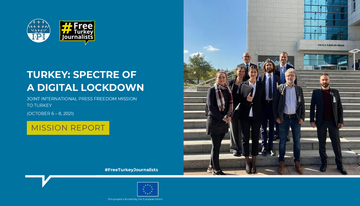Publication Date:
May 2022
Publisher:
International Press Institute (IPI)

The report found that
- Violence against journalists is widespread and often conducted by gangs incited by politicians and by the police during public demonstrations.
- Journalists continue to face arbitrary prosecution and judicial harassment through anti-terror, defamation, and other laws. 2021 saw 135 different trials involving journalists of which almost half involved anti-terrorist charges.
- The politicization of the judiciary has profoundly eroded the rule of law with the lack of judicial independence at the root of many of the country’s press freedom problems.
- The Constitutional Court continues to provide a certain level of protection, but when it does make a positive ruling, it is usually many years after the event and too late to serve justice. Moreover, lower courts often either ignore implementation of court rulings or ignore precedents set by the Constitutional Court, allowing the same violations to repeat themselves.
- The broadcast regulator, RTUK, and state advertising agency, BIK, are equally compromised and used by the government to punish, fine, or remove funding from independent and critical media.
- Parliamentary bodies established to monitor the impact of legislation on human rights are sidelined as laws are drafted by the presidential administration and presented to parliament to rubber-stamp
The content of this article can be used according to the terms of Creative Commons: Attribution-NonCommercial 4.0 International (CC BY-NC 4.0) . To do so use the the wording "this article was originally published on the Resource Centre on Media Freedom in Europe" including a direct active link to the original article page.

